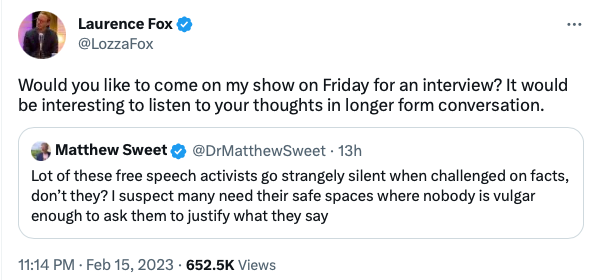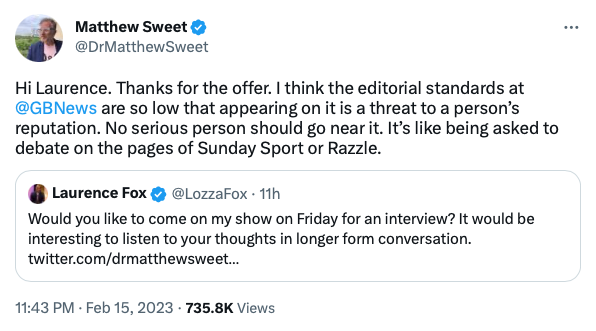Finally, a Labour government will be very, very funny. We’ll enjoy Keir Starmer frantically attempting to make sense of his little bag of contradictions. We’ll eat popcorn as the Corbynites feud with the New Labour nostalgists. We’ll watch MPs who can barely spell “policy” do policy (of course, that’s nothing new but it will be fun to have a different cast of characters). This might be small consolation, but what is life without morbid comedy?
|
|||||
|
“In many cases rent control appears to be the most efficient technique presently known to destroy a city, except for bombing” – Economist Assar Lindbeck, who as it happens was a socialist I posted this on the day of the invasion and I think it aged pretty well.
I still see things much the same and am delighted my fears about a lack of meaningful support for Ukraine were misplaced. Taking the meme ‘Everyone I Don’t Like Is Hitler’ to dizzying new heights, now we’re being told it’s far right to want to drive your car. Motorist and fascist, peas in a pod. Protesters against Low Traffic Neighbourhoods and so-called 15-minute cities – policies being adopted in various regions of the UK that will severely limit where and how often a person can drive his car – have been damned as hard-right loons. Who but a modern-day Brownshirt would bristle at eco-measures designed to save Mother Earth from car toxins? One author attended this month’s colourful protest against Oxford City Council’s anti-driving policies and decreed that this motley crew of car-lovers are on ‘the road to fascism’. Only they’ll never get there, presumably, given the elites’ penchant for road restrictions. As for Ukraine itself — yes, it’s complicated. History always is. It’s true that ever since independence, the country’s politics have been horrendously corrupt, as evidenced by Zelenskyy’s recent crackdown on venal ministers and officials. It’s also true, by the way, that its politics have long had an unpleasantly nationalistic, indeed openly neo-Nazi fringe. But I don’t think this is the devastating trump card that professional contrarians and Putin apologists think it is. If we were to withdraw our sympathy from every European country with unpleasant far-Right political elements, then we wouldn’t have any friends left. On that basis, would we still have supported Poland in 1939? Would we intervene to help Italy today, or France, or even the United States? Presumably not. The really striking thing about the war in Ukraine, it seems to me, is that at a fundamental level it actually isn’t complicated. And for all the cheap and tawdry attractions of contrarianism, the right conclusion is the obvious conclusion. Ukraine didn’t attack Russia; Russia attacked Ukraine. Zelenskyy isn’t perfect and Putin isn’t Hitler; but one really is on the side of the angels, and the other will surely rank alongside the villains of history. One appeals to European solidarity and common humanity; the other to xenophobia and national chauvinism. One defends his own territory; the other seeks to seize somebody else’s. One is right, the other is wrong. The Ukraine conflict has merely demonstrated that Mearsheimer’s realism is as ineffective at understanding the present as it has been at predicting the future or explaining the past. Fitting Putin’s misbegotten imperial adventure into a realist framework requires a conception of international relations that awards Western democracies the power of choice but reduces their enemies to victims of circumstances. And it demands an understanding of Russian aggression so indulgent that it is indistinguishable from appeasement. “The U.S. and NATO, in their innermost sanctum, should be asking themselves a question and probably are: Would this war already be over if they had sent a couple dozen F-35s to assert mastery over the skies of at least Western Ukraine on or about day 14?” – Holman W. Jenkins, jnr (Wall Street Journal $). Fight the Power, Oxford Antifa! “On Saturday 18 February, fascists and climate deniers are planning a “community day” in Oxford to exploit concerns and tensions around traffic filters. We won’t allow it!”
Hat tip to Andy Ngô. I have not looked that hard into this “15-minute” city business. This article by Henry Grabar on Slate dismisses opposition to it as a ludicrous conspiracy theory. Well, the first few paragraphs do. However nine paragraphs down he is not sounding so sure:
Despite Oxford Antifa not giving their permission, the demonstration did take place. Dave Vetter, an Oxford-based climate journalist, was there, and took a lot of pictures and videos. He called the demo “an intoxicating mix of far-right conspiracy slogans, antisemitism and really terrible hip-hop.” I’ll believe him when he says he talked to one person who said Ashkenazi Jews were “not like us”; all demos attract a certain proportion of lunatics. But one would think that if antisemitism really were a big part of the Oxford crowd’s motivation, he would have had no trouble finding loads of placards proclaiming it to photograph. As the man doesn’t understand what neoliberalism is his critique is going to be weak tea, no? |
|||||

All content on this website (including text, photographs, audio files, and any other original works), unless otherwise noted, is licensed under a Creative Commons License. |
|||||





